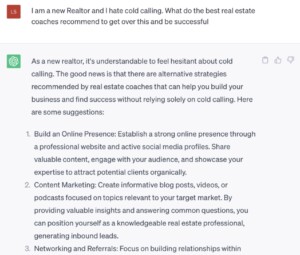This article was originally posted on retechnology.com.
Artificial intelligence (AI for short) is arguably one of the biggest trends in real estate — and beyond — in 2023. What’s truly amazing is how fast the industry has figured out how AI can be used in real estate. Agents and brokers are using it for different tasks that would ordinarily take a person hours, if not longer.
RE Technology hosted a webinar on Tuesday, September 19, with Liz Sturrock, the Chief of MLS and Innovation at Miami REALTORS(R). Sturrock’s job is to stay apprised of both risks and the opportunities when new technologies are introduced. She shared tips for brokers whose agents are interested in using AI.
The full webinar on demand is available at the end of this article.
Who should be using AI?
Whenever a new technology is introduced, the first question everyone (not just real estate agents) asks themselves is something like: “Will this disrupt my business and possibly put me out of a job?”
Sturrock believes that AI is not going to replace agents outright. However, agents and brokerages that are the most successful at leveraging these tools will be able to outperform agents and brokers who don’t.
Tip 1: Start experimenting with AI today. It will likely be a game-changer for your business, and you’ll want to get a head start.
What are some of the risks of using AI?
Like any new technology, AI is not perfect. There are some caveats that Sturrock provided for real estate professionals who are interested in testing it out.
Tip 2: Beware of copyright challenges.
Photographers are (rightfully so) protective of their images. If you’ve ever published an image from a stock image source and received a cease-and-desist notification, then you know this already.
Who owns an image that’s a composite of two (or more) images that are found all over the internet? There are no solid legal answers here. Have questions about whether an AI image project you’re planning is fair-use legally? The best way to find an answer is to ask an attorney.
Tip 3: Check for plagiarism.
Writers and publishers will also take steps to shut down a content operation if their work is not being attributed. But even if it is attributed, reposting large chunks of text from other sources is not usually a great reading experience. Depending on how you’ve chosen to cite the source, even attribution might not be enough to escape legal hassles.
If you don’t already use a plagiarism checker at your brokerage, it’s probably a good idea to invest in one. Then you can pass any AI-written content through it before you publish it on your website.
Tip 4: Be vigilant about data privacy.
One way that AI “teaches” itself to be smarter is by reviewing the inputs (including the data) that people feed to it. Let’s say you’re suggesting an AI tool to agents, and they use it to create content around home listing data. You will want to understand how the AI is storing that data and whether it will get funneled into a larger project later.
Tip 5: Cite sources and check for accuracy.
It’s a good practice to always cite your sources. One thing to be aware of when using AI tools (such as ChatGPT) to write content is that it will sometimes create sources from thin air. These tools have even provided fake source information (such as backlinks) that look real.
When you ask an AI tool to write something for you, make sure you’re double-checking any numbers, data, survey information, or other facts that it might have decided to generate for you.
How can AI be used in real estate?
Once you’ve apprised yourself of the risks, it’s time to start learning more about how AI can help you be a better broker-owner. Here are the top ways Sturrock and her team are using AI at Miami REALTORS(R).

Tip 6: AI coaching is a search engine on steroids
People who know how to use Google and Bing well can find a lot of great information on the internet, including how to solve certain business problems that are occupying their time and energy. It’s possible to use AI as a sort of search-engine-based coach.
For example, you can ask some AI tools questions (“what would the best real estate coaches tell me to do to get over my dislike of cold-calling?”) and see what kind of advice it pulls up. You can also ask it for business strategy ideas, motivation tactics, and more.
Tip 7: AI can engage and nurture leads
Chatboxes and widgets that answer visitor questions on a real estate website are not new. One thing that is new is the level at which these widgets can interact and engage with people.
Some software tools offer live texting options for the agent or broker who owns the website. This allows them to jump in and take over the conversation in real time.
Tip 8: Quickly and easily generate content
Tools like ChatGPT can be used not only to write things like blog articles and social media posts once you provide a list of ideas — they can also provide the ideas for you. Try prompts like “give me three reasons why you might want to buy a house in today’s market,” or provide it with a localized market data feed (such as RPR’s) and ask it to tell you what trends it sees.
Remember when you’re using AI tools to generate content that you’ll want to check any sources cited as well as check for plagiarism before you publish that post, especially if it’s going on a website. If the piece is too close to something else that’s online, you can always ask the AI to try again!

An AI-generated image of a “futuristic real estate brokerage office.” Created on Canva.
We used Canva’s AI tool to create the featured image for this story; the prompt was “robot selling a house.” And here’s what Canva generated when we asked it to show us a “futuristic real estate brokerage office.”
Tip 9: Property descriptions are a breeze for AI
Listing descriptions are not every agent’s favorite thing to write. There are specialized platforms now available that can guide agents through a quiz flow, answering certain questions about the property. The tool will then create a captivating property description in seconds.
Tip 10: Stage homes and enhance photos
The ability to add furniture and even certain features to home listing photos has been available for some time now, but the most recent AI photo generation tools take this ability to a whole new level. You can ask AI staging tools to recreate the same room in a different style, such as “rustic” or “jungle,” and even simple enhancements are much easier and faster with AI.
Remember to use disclaimers and disclose that enhanced photos have been modified from their original format.
Tip 11: AI makes finding a house easier
It’s one thing to send buyer clients a list of homes in the MLS that meet their criteria; it’s entirely another thing to provide them with personalized recommendations that are curated by AI and that get smarter every time the buyer shows interest (or disinterest) in a listing.
For more details — including specific product information from Sturrock — watch the full webinar.




